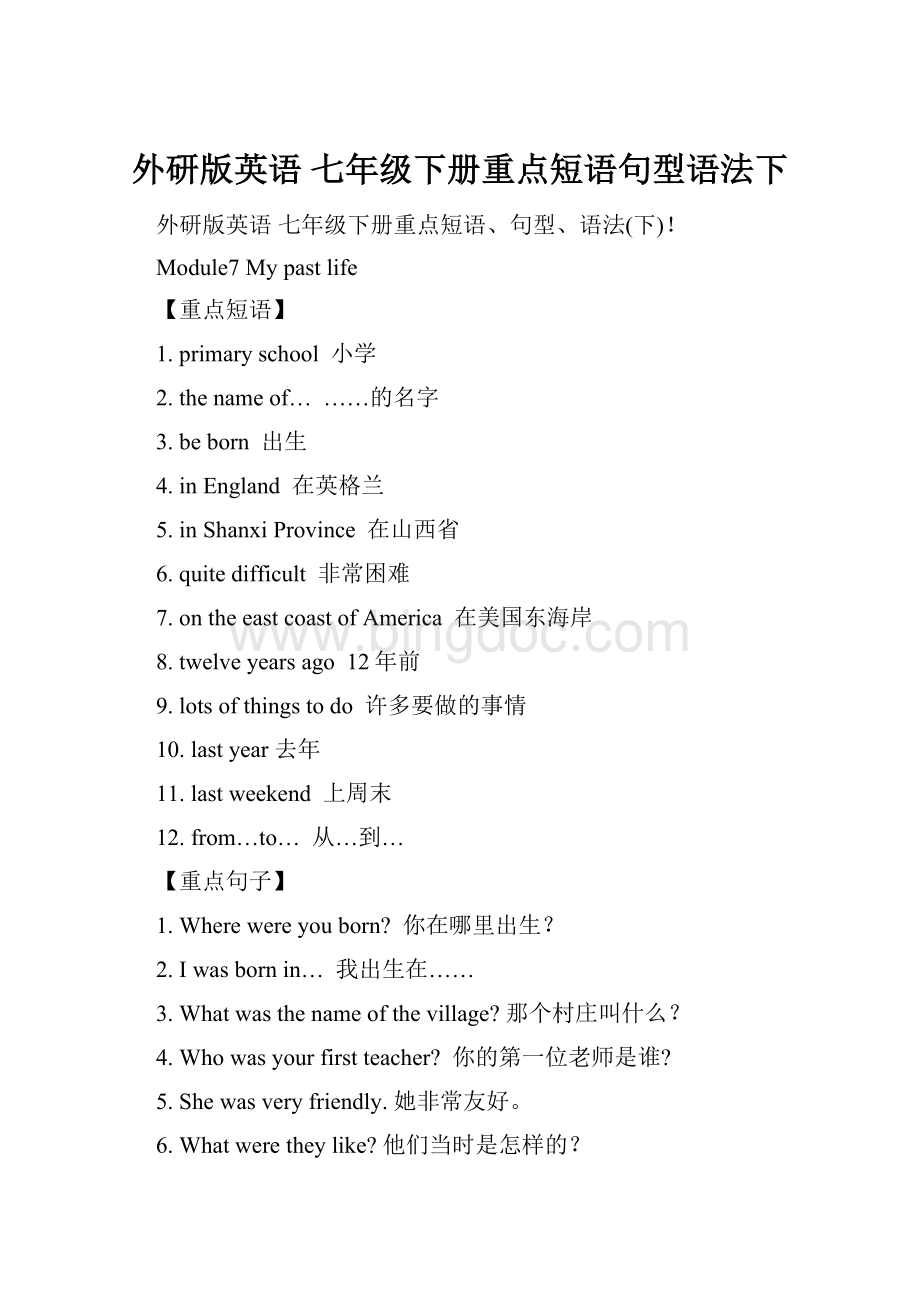外研版英语 七年级下册重点短语句型语法下.docx
《外研版英语 七年级下册重点短语句型语法下.docx》由会员分享,可在线阅读,更多相关《外研版英语 七年级下册重点短语句型语法下.docx(14页珍藏版)》请在冰点文库上搜索。

外研版英语七年级下册重点短语句型语法下
外研版英语七年级下册重点短语、句型、语法(下)!
Module7Mypastlife
【重点短语】
1.primaryschool 小学
2.thenameof… ……的名字
3.beborn 出生
4.inEngland 在英格兰
5.inShanxiProvince 在山西省
6.quitedifficult 非常困难
7.ontheeastcoastofAmerica 在美国东海岸
8.twelveyearsago 12年前
9.lotsofthingstodo 许多要做的事情
10.lastyear去年
11.lastweekend 上周末
12.from…to… 从…到…
【重点句子】
1.Wherewereyouborn?
你在哪里出生?
2.Iwasbornin… 我出生在……
3.Whatwasthenameofthevillage?
那个村庄叫什么?
4.Whowasyourfirstteacher?
你的第一位老师是谁?
5.Shewasveryfriendly.她非常友好。
6.Whatweretheylike?
他们当时是怎样的?
7.Whatwereyoulike?
你当时是怎样的?
8.TherewerelotsofthingstodoinQuincy.在昆西有很多事情可以做。
9.TherewasabiglivingroomwithaTV,akitchen,abathroomandthreebedrooms.有一间大的起居室,里面有一台电视机,还有一间厨房,一个卫生间和三间卧室。
10.Onmybedroomwallstherewerepicturesofmyfavouritemoviestars.在我卧室的墙壁上,贴有我最喜欢的影星的图片。
11.Behindthehouse,therewasabiggardenwithlotsoftreesandtherewasasmalllakewithfishinit.Itwasgreattoplaythere.房子后面有一个大花园,花园里有很多树,还有一个小湖里面有鱼。
在那里玩耍真好。
12.Iwasthereforthelasttimein2010. 我最近一次住在那里是在2010年。
【重点语法】
M7—M10一般过去时
一般过去时表示过去某个时间发生的动作或存在的状态,常和表示过去的时间状语连用。
一般过去时也表示过去经常或反复发生的动作。
一.动词过去式变化规则:
1.一般在动词末尾如加ed,如:
pull-pulled,cook-cooked
2.不发音的字母e结尾的单词末尾加d,如:
taste-tasted hope-hoped
3.末尾只有一个元音字母和一个辅音字母的重读闭音节,双写末尾的辅音字母,再加ed,如:
stop-stopped
4.以“辅音字母+y”结尾的,变y为i,再加-ed,如:
study-studied worry-worried5.
不规则动词过去式:
am/is-was are-weredo-did see-sawsay-said give-gave get-got go-went come-came have-had eat-ate take-took run-ran sing-sang put-put make-made read-read write-wrote draw-drew drink-drank fly-flew ride-rode speak-spoke sweep-swept buy-bought swim-swam sit-sat bring-brought can-could cut-cut become-becamebegin-began draw-drew feel-felt find-found forget-forgot hear-heard keep-kept know-knew learn-learnt(learned)leave-leftlet-let lose-lost meet-met read-read sleep-slept speak-spoke take-took teach-taught tell-told write-wrote think-thought
二.句子结构 一般过去时的助动词did
1.陈述句
主语+动词过去式+其他
主语+was/werenot+其他
主语+didn’t+动词原形+其他
Jimwenthomeyesterday.
Jimdidn’tgohomeyesterday.
2.一般疑问句 be/助动词did提到主语前
Was/Were+主语+其他 答语:
Yes,主语+was/were./ No,主语+wasn't/weren't.
Did+主语+动词原形+其他 答语:
Yes,主语+did./ No,主语+didn’t.
3.特殊疑问句 特殊疑问词+一般疑问句
(1).WhatdidJimdoyesterday?
(2).Whowenttohomeyesterday?
三.常用时间状语
yesterday, thedaybeforeyesterday, lastweek/night/month/year…,时间段+ago多久以前,after+时间点=时间段+later多久以后,justnow刚刚, theotherday前几天/不久前某天,inthepast在过去, in+过去时间,in2001在2001年
Module8Storytime
【重点短语】
1.onceuponatime 从前
2.intheforest 在森林里
3.lookinto 向…里面看去
4.knockonthedoor敲门
5.agirlwithhairofgold一个留着金色头发的女孩
6.beginwith 以…开始
7.goforawalk 去散步
8.pickup捡起,拾起
9.picksomeflowers摘一些花
10.lookaround 环视,四下张望
11.inpieces破碎
12.atfirst首先,最初
13.sitdown坐下
14.pointat 指着
15.walkintothebedroom走进卧室
16.jumpoutofbed跳下床
17.beasleep睡着
19.changeinto变成…
20.againandagain 一遍又一遍
21.aroundtheworld全世界
【重点句子】
1.Allaloneinthedarkforest,Goldilockspickedsomeflowers.金凤花姑娘独自走进了阴暗的森林里,摘了一些花。
3.Thenshenoticedalittlehouse,soshehurriedtowardsit,andknockedonthedoor. 她注意到一栋小房子,于是她赶快朝那栋房子走了过去,敲了敲门。
4.Nobodyanswered,sosheknockedagain,andagain. 没人回应,于是她又反复的敲门。
5.Onatabletherewerethreebowlswithsomenicefoodinthem. 在一张桌子上有三个碗,碗里盛着好吃的东西。
6.Thelittlebowlwasjustright.Shefinishedallthefoodinit. 小碗里的正好,她把小碗里的东西全吃光了。
7.Itwasnotcomfortableeither.它也不舒服。
8.Soonthechairwasinpieces.那把椅子一会儿就散架了。
9.Verysoonshewasasleepinit.很快她就在小床上睡着了。
10.ThenBabyBearpointedatthelittlegirlinhisbed.
小熊指了指他床上的小女孩。
11.Goldilocksjumpedoutofbedandhurriedoutofthehousewithoutherbasket.金凤花姑娘从床上跳了下来,也顾不上提篮子,便冲出了房间。
Module9Lifehistory
【重点短语】
1.attheageof 在…岁时
2.SpringFestive春节
3.Teacher’sDay教师节
4.bedifferentfrom与…不同
5.Women’sDay妇女节
6.findout 发现
7.NationalDay 国庆节
8.ontheInternet 在网上
9.Children’sDay 儿童节
10.aswell 也
11.NewYear’sDay 新年
12.leaveschool 离开学校
13.MayDay/LabourDay 劳动节
14.inmanyotherlanguages 用许多其他的语言
15.halfanhour半小时
16.halfpastfive五点半
17.beworthdoing值得做
18.getmarried 结婚
【重点句子】
1.I’mwritingabouthimformyEnglishclass. 我在写关于他的介绍,上英语课要用的。
2.WecanfindoutabouthimontheInternet. 我们可以在网上找到关于他的资料啊。
3.Heleftschoolandbeganworkattheageof12. 他12岁就离开学校开始了工作了。
4.ButhetookthenameMarkTwainandbecameveryfamousinthe1860s. 不过在19世纪60年代,他用了马克•吐温这个名字,并且变得很有名。
5.Likemanypeoplefourhundredyearsago,Shakespeare’sparentsdidn’tlearntoreadorwrite. 像四百多年前的许多人一样,莎士比亚的父母不识字。
6.Atschoolhelikedplays,sohedecidedtobeanactorwhenhefinishedschoolat14.在他14岁毕业的时候,他决定成为一名演员。
7.Hebecameasuccessfulactorandbegantowriteplays. 他成为了一名成功的演员,并开始写剧本。
8.Youcanvisitthetheatretoday,butitisn’tthesamebuilding. 今天你还可以去参观那个剧院,不在已是当年那个建筑了。
9.Therewasafireintheoldtheatre.老剧院发生过火灾。
10.WilliamShakespearediedattheageof52. 威廉•莎士比亚52岁去世。
11.YoucanstillseehisplaysinEnglishandinmanythelanguages.你现在依然可以看见他的戏剧以英文和其他许多语言在演出。
12.He’sfamousaroundtheworld.他举世闻名。
Module10Aholidayjourney
【重点短语】
2.driveustotheirhome 开车带我们去他们家
3.goswimming 去游泳
4.getthere到那儿
5.aspecialholiday 一个特殊的假期
6.attheairport 在机场
7.haveagoodtime玩得高兴
8.bewithsb.和某人一起
9.onholiday度假
10.byplane坐飞机
11.suchas例如
12.thedaybeforeyesterday前天
13.takeawalk散步
14.manyworld-famousworksofart 许多世界著名的艺术品
15.firstofall 首先
16.waitinline 排队等候
17.spendallday花整天时间
18.takelotsofphotos 照许多照片
【重点句子】
1.—Whereareyougoingonholiday,Tony?
你打算去哪儿度假,托尼?
—ToLosAngeles. 去洛杉矶。
2.Iwenttheretwoyearsagoandenjoyeditalot. 我两年前去过,玩的很开心。
3.Howlongdidittaketogetthere?
你花了多长时间去那里?
4.Thenourfriendsmetusanddroveustotheirhome.然后我们的朋友去接我们,开车带我们到他们家。
5.Guesswhat?
你猜怎么着?
6.Westayedtherefortwodays.我们在那里呆了两天。
7.JennyandIarrivedbyplanethedaybeforeyesterday. 珍妮和我前天坐飞机到的。
8.Weweretiredsowerelaxedathomeandbeganourtourofthecityyesterday.我们感觉很累,所以我们在家休息,昨天开始在市里观光。
9.Ithasmanyworld-famousworksofart,suchastheMonaLisa. 它有许多世界闻名的艺术品,比如《蒙娜•丽莎》。
10.Thismorningwetookawalk.今天上午我们去散步了。
11.Wealsodidsomeshopping.Iboughtapresentforyou.Ihopeyou’lllikeit!
我们也买了些东西,我也给你买了件礼物,希望你会喜欢。
12.Therewerelotsoftourists,sofirstofall,wehadtowaitinlineforanhour,andthenwewenttothetop.Wewaitedtillallthelightswereon.有很多游客,所以我们得排队等一个小时,后来我们到了塔顶。
我们在那儿一直等到所有的灯都亮了起来。
13.Tomorrowwe’regoingtovisitafamouspalaceandtakeaboattourontheRiverSeine. 我们明天要去参观一个著名的宫殿,还要乘船游览塞纳河。
Module11Bodylanguage
【重点短语】
1.bodylanguage 肢体语言
3.nodhead 点头
4.bestfriend 最好的朋友
5.shakehands 握手
6.eachother互相
8.foreignstudents外国学生
9.infact事实上
7.standcloseto站得离......近
8.belateforclass上课迟到
9.moveaway 离开,搬走
10.classrules 班规
11.listento听
12.standinline 站成一排
13.enterthelabalone 独自进入实验室
14.ontime 准时,按时
【重点句子】
1.I’mwelcomingthevisitors.
我要去迎接这些参观者。
2.HowdoIdothat?
我该怎么做呢?
3.Ididn’tknowthat.我(原来)可不知道。
4.WeChineseoftenshakehandsandsmilewhenwemeetvisitors,andsometimeswenodourheads. 我们中国人见到来访者的时候经常握手、微笑,有时候点头示意。
5.That’sbecausepeopledodifferentthingsindifferentcountries.那是因为不同的国家的人做法不同。
6.Ournewforeignstudentsaregoingtoarriveverysoon,andherearesomewaystowelcomethem.
我们的外国新生很快就要到了。
下面是迎接他们的一些方式。
7.Howclosedoyoustandwhenyoutalktoafriend?
当你和朋友交谈时站得有多近呢?
8.Butdon’tstandtoocloseto…但是不要站的离……太近!
9.Givethemmorepersonalspace.给他们更多的个人空间。
10.Howabouttouchingpeople?
那么关于身体接触呢?
11.Chinesegirlsoftenwalkarminarmwiththeirfriends.中国女孩就常常和朋友手挽着手走在一起。
12.ButinBritainmanypeopledon’tlikeotherpeopletotouchthematall.但在英国,许多人一点也不喜欢别人碰他们。
13.Insomeplaces,itisn’tpolitetolookatpeoplewhentheytalk,butinothercountriesitisn’tpolitetolooksomewhereelse. 在一些地区,交谈时看着对方是不礼貌的,但在另外一些国家,交谈时看别的地方是不礼貌的。
14.Andhowdoyousaygoodbye?
That’seasy.Wavetosaygoodbye. 如何表示告别呢?
那很简单,挥手告别。
15.InGreece,it’snotatallpolite!
Infact,it’sveryrude!
在希腊,那绝对是不礼貌的!
事实上,那是很粗鲁的!
【重点语法】
祈使句
祈使句用来表达叮嘱、劝告、希望、禁止、请求或者命令等。
特点是:
1. 祈使句没有主语,可以理解为省略主语you;2.以动词原形开头,没有时态和数的变化。
祈使句类型
肯定形式:
动词原形开头
Sitdown,please.请坐。
Hurryup!
快点!
Bequiet. 安静点儿。
Let’sgo. 我们走吧。
否定形式:
Don’t+v.原形;No+n./doing
Don’tbelateagain.不要再迟到了。
Nosmoking.禁止吸烟。
Module12Westernmusic
【重点短语】
1.BeijingOpera 京剧
2.thecapitalofAustria奥地利首都
3.thinkabout认为,考虑
4.popmusic流行音乐
5.WesternMusic 西方音乐
6.danceto 随着…跳舞
7.thecenterof…的中心
8.Europeanclassicalmusic 欧洲古典音乐
9.ontheriver在…河畔
10.hundredsofwonderfulpiecesofmusic数以百计的美妙的乐曲
11.playmusic 演奏音乐
12.traditionalmusic传统音乐
13.takeplace发生
14.atthesametime同时
15.watchitonTV在电视上观看
16.typesofmusic音乐的类型
17.therestof其余的...
18.inthelasttenyears在过去的十年里
19.atthattime 在那时
【重点句子】
1.ThisisWesternmusic,isn’tit?
这是西方音乐,是吧?
2.—IsthisbyStraussorMozart?
这是斯特劳斯还是莫扎特的作品?
—It’sbyStrauss.它是斯特劳斯的作品。
3.Doyouknowanythingabouthim?
你了解他吗?
4.Whatabeautifulcity!
多么美丽的城市!
5.ThisiscalledTheBlueDanube.这首乐曲叫《蓝色多瑙河》。
6.ItgoesthroughVienna.它流经维也纳。
7.Listentothisfantasticvoice.你听这绝妙的嗓音。
8.I’mafanofrockmusic.我是一个摇滚乐迷。
9.Giveusabreak!
让我们清净一会吧!
(饶了我们吧!
!
)
10.It’ssonoisy!
Andmuchtoofast!
太吵了!
而且节奏太快了。
11.Ido